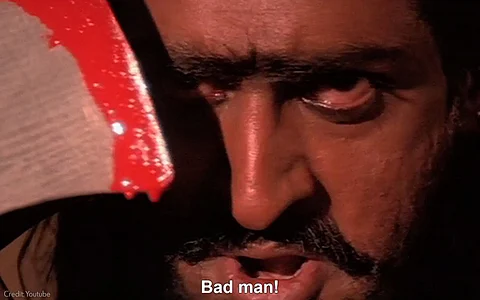
- Reviews
- Power List 2024
- Cannes 2024
- In-Depth Stories
- Web Stories
- News
- FC Lists
- Interviews
- Features
- FC SpecialsFC Specials

Written by: Gulshan Grover with Roshmila Bhattacharya
Published by: Penguin Random House India
The most important thing about writing a biography is not having a story, but knowing how to tell your story. Bad Man, Gulshan Grover's biography is a ravishing story without a narrative. The story, that of alternating anguish and success is a fascinating one that needed to be archived. But the book reads like an extended acknowledgment, as if Grover and Roshmila Bhattacharya, the writer, decided to go down the list of his filmography asking themselves "Is there a story here? Anyone to be grateful for?"
This begs a larger question- how do you tell a story?
This is fundamentally a story of a man obsessed with his image, that of Bollywood's Bad Man. This would have been a good place to start. Why, in a universe where thresholds and barriers are merely meant to be shattered, does Grover possess a steadfast resolve to keep recreating and recycling the Bad Man trope? What is the allure of a shattered moral compass? Despite wolfing down the words- cover to cover, I cannot come up with a coherent answer.
The struggle of the artist is written about in relation to the success, not as its own beating heart… Any memory that cannot be folded into his success seems to either be edited out or transitioned into in a very contrived manner.
The struggle of the artist is written about in relation to the success, not as its own beating heart. Every time his childhood is spoken about, it is in relation to his later success. Any memory that cannot be folded into his success seems to either be edited out or transitioned into in a very contrived manner. So, when he speaks about his endearing friendship with Tina Ambani, he ropes in her role in running a hospital and transitions into his father agonizing in a hospital. I had to go back to make sure I hadn't lost a thread of thought. However, that is not how lives are lived, and definitely not how narratives are constructed in novel form.
There are heartwarming moments. One where Gulshan in his youth used to peep into theatre screenings through a hole in the tin shed is written about with nostalgic ardour. It is both the allure of cinema, and the boredom and notoriety of childhood that makes him do this repeatedly. The latter reason is axed, it is solely the allure of cinema that is spoken to. This is a great cinematic choice, but in a biography it feels like an equation being written, too calculated, too precise. Good literature is often about an extravagant mess, with lines connecting, circling, unfinished. This thus becomes a book privileging those journeys that ended up somewhere. The somewhere being the hallowed cinema halls. Everything else, is irrelevant.
Bad Man is essentially a book about Grover being a Good Man
His personal life too is spoken about only in terms of his doting sacrificing mother, the achievements of his son, the benevolence of friends and his utmost love, respect, and awe for the people he is surrounded by. In that sense, Bad Man is essentially a book about Grover being a Good Man.
There is a glimpse of him deviating from this when his son as a child wanted to sleep with him, while his 'lady friends' were over. But even that is written as if it were afraid of a censor board cut. Where is the phaila raita?
Grover's journey, in pursuit of his technicolour dream, has such a beautiful arc. His success at home, juxtaposed with his initial failure abroad, the tethered rope to home fraying and snapping, his reconciling, the back and forth, being shipped in, shut out. There is no doubt that this is a life that deserved to be written about.
In the universe of cinema when the professional is so intimately wrapped around the personal, this story tries to separate the two, making a distinction, without delving deeply into either- therein lies its failure. Add to this the amateur writing, and the clear self-reverential voice, and it gets tedious. Grover's voice is only interested in his journey. Not a single supporting character is given room to grow. All the references are in relation to his successes, all his rendezvous, attesting to his goodwill. This solipsism, adulterated by the immense gratitude Grover feels creates a voice that though initially is intriguing, ends up becoming nauseous, like a modest but self-obsessed caricature.
The book is overpopulated with names of people and films, most of which have no relevance to the narrative. In that sense, it is like living in Mumbai- overpopulated, with more stories than narratives, more characters than characterizations. When a director is introduced tangentially, all their landmark films and awards are listed. When an actor is introduced, their filmography is reproduced. When a party is attended, the entire guest list is pasted. I did not care much for any of the names because I have no familiarity with that space, but more importantly because it does not add to my understanding of Gulshan Grover, the icon. That needed more stories, more tension, more drama. This book feels like it was birthed as a listicle. But alas, laundry lists are not literature.